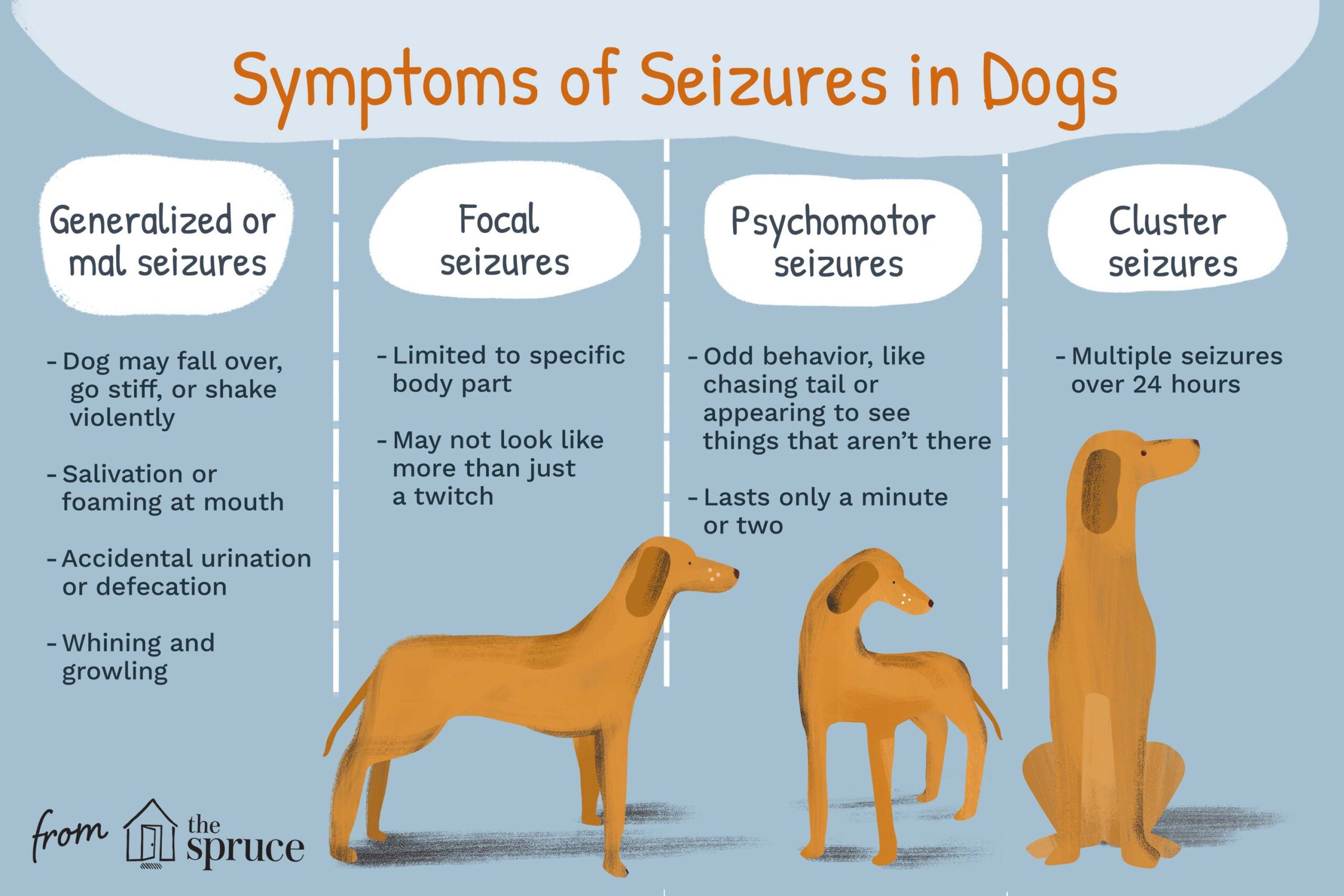Key Takeaways:
-
1. Certain dog breeds, such as Labrador Retrievers and Golden Retrievers, have shown exceptional abilities in alerting their owners before a seizure occurs.
2. Dogs trained to detect seizures can provide a sense of security and independence for individuals with epilepsy or other seizure disorders.
3. It is important to choose a dog breed that matches the individual's lifestyle and needs, considering factors like size, energy level, and temperament.
4. Breeds like Border Collies and German Shepherds are known for their intelligence and trainability, making them excellent candidates for seizure alert dogs.
5. Proper training and socialization are crucial for any potential seizure alert dog to ensure they can effectively recognize and respond to pre-seizure cues.
Are you or someone you know living with epilepsy or seizures? If so, then understanding the best dog breeds for seizure alert could be life-changing. These incredible dogs have the ability to sense an oncoming seizure before it even happens, giving their owners valuable time to prepare and seek help. Imagine having a furry companion by your side who not only provides unconditional love but also acts as your personal health guardian. In fact, studies have shown that these specially trained dogs can detect seizures with an astonishing accuracy of up to 90%! So, whether you're seeking a loyal friend or looking for ways to manage your condition more effectively, exploring the top 10 dog breeds for seizure alert is a journey worth taking. Let's dive into this fascinating world where our four-legged friends become heroes in times of need.
Top 10 Dog Breeds That Can Help Alert People During Seizures
1. Labrador Retriever
The Labrador Retriever is one of the most popular dog breeds for seizure alert tasks. They are intelligent, loyal, and have a strong sense of smell. Labs can be trained to recognize the scent changes in a person's body before a seizure occurs.
2. Golden Retriever
Golden Retrievers are known for their friendly and gentle nature. They are also highly trainable and have an excellent sense of smell. These qualities make them great candidates for seizure alert work.
3. German Shepherd
German Shepherds are intelligent, protective, and easily trainable. They have a strong sense of loyalty towards their owners and can be trained to detect seizures by observing changes in behavior or body language.
4. Standard Poodle
Standard Poodles are highly intelligent and trainable dogs. They have a keen sense of smell and can be trained to detect chemical changes in the body that occur before a seizure.
5. Border Collie
Border Collies are known for their intelligence and agility. They can be trained to recognize behavioral cues or physical changes that indicate an impending seizure.
6. Bernese Mountain Dog
Bernese Mountain Dogs are gentle giants with a calm demeanor. They have a strong bond with their owners and can be trained to respond to seizures by providing comfort or seeking help.
7. Australian Shepherd
Australian Shepherds are highly trainable and energetic dogs. They have a strong instinct to protect their owners and can be taught to recognize signs of an oncoming seizure.
8. Boxer
Boxers are known for their loyalty and protective nature. They can be trained to alert their owners or caregivers when they sense a seizure is about to occur.
9. Doberman Pinscher
Doberman Pinschers are intelligent and loyal dogs. They have a strong instinct to protect their owners and can be trained to recognize signs of an impending seizure.
10. Newfoundland
Newfoundlands are gentle giants with a calm and patient temperament. They can be trained to provide comfort and support during seizures, as well as alert others for help if needed.
These dog breeds have specific characteristics that make them well-suited for seizure alert tasks. Their intelligence, loyalty, and ability to detect changes in behavior or scent make them valuable companions for individuals experiencing seizures.
How Specially Trained Dogs Assist Individuals Experiencing Seizures
Specially trained dogs can assist individuals experiencing seizures by providing both physical and emotional support. These dogs are trained to recognize the signs of an oncoming seizure and can alert their owners or caregivers beforehand. This early warning allows individuals to take necessary precautions or find a safe place before the seizure occurs.
During a seizure, these dogs can provide comfort and stability by staying close to the person and preventing them from falling or getting injured. Some dogs are also trained to perform specific tasks, such as retrieving medication or activating an emergency response system.
The presence of a seizure alert dog can also have a calming effect on individuals with epilepsy, reducing anxiety and stress associated with seizures. These dogs become trusted companions who provide not only practical assistance but also emotional support during challenging times.
Why Certain Dog Breeds Are Better Suited for Seizure Alert Tasks
Certain dog breeds are better suited for seizure alert tasks due to their specific characteristics and abilities. These breeds often have a strong sense of smell, intelligence, and a natural instinct to protect their owners. They can be trained to recognize subtle changes in behavior or scent that indicate an impending seizure.
Additionally, these breeds are known for their loyalty and willingness to please their owners, making them highly trainable. Their calm and gentle nature also makes them well-suited for providing comfort and support during seizures.
It's important to note that while certain dog breeds may be more predisposed to excel in seizure alert tasks, individual dogs within those breeds may vary in their capabilities and temperament. Each dog is unique, and it's essential to assess their individual traits and suitability for the specific needs of an individual with epilepsy.
Characteristics That Make These 10 Dog Breeds Ideal for Seizure Alert Work
The following characteristics make these 10 dog breeds ideal for seizure alert work:
- Intelligence: These breeds are highly intelligent, making them easier to train for complex tasks.
- Loyalty: They have a strong bond with their owners and are dedicated to protecting them.
- Sense of Smell: Many of these breeds have an exceptional sense of smell, allowing them to detect chemical changes in the body before a seizure occurs.
- Gentleness: These dogs have a calm and gentle nature, which is crucial when providing support during seizures.
- Ease of Training: These breeds are known for being trainable due to their intelligence and willingness to please their owners.
These combined qualities make these 10 dog breeds well-suited for the demanding tasks of seizure alert work.
Training Time for Dogs to Recognize and Respond to Seizures
The training time for dogs to recognize and respond to seizures can vary depending on several factors, including the individual dog's temperament, intelligence, and previous training experience. On average, it can take several months to a year of consistent training for a dog to become proficient in seizure alert tasks.
The training process involves teaching the dog to recognize specific behavioral or scent cues associated with an impending seizure. This often includes positive reinforcement techniques such as rewards or clicker training.
It's important to note that training is an ongoing process, and dogs may require regular reinforcement and practice to maintain their skills. Regular refresher sessions and continued reinforcement of learned behaviors are essential to ensure the dog remains reliable in recognizing and responding to seizures.
Important Considerations Before Adopting a Seizure Alert Dog
Before adopting a seizure alert dog, there are several important considerations to keep in mind:
- Commitment: Owning a seizure alert dog requires a significant commitment of time, energy, and resources. It's important to be prepared for the responsibilities involved in caring for a working dog.
- Training: Properly training a seizure alert dog requires expertise and dedication. It may be necessary to work with professional trainers who specialize in service or assistance dogs.
- Lifestyle Compatibility: Consider your lifestyle and living situation. Some breeds may require more space or exercise than others.
- Allergies: Some individuals may have allergies or sensitivities to certain breeds of dogs. It's important to consider potential allergic reactions before adopting a specific breed.
It's also crucial to research reputable breeders or rescue organizations that specialize in seizure alert dogs. Working closely with professionals can help ensure that the dog's temperament, health, and training are suitable for the specific needs of an individual with epilepsy.
Positive Impact of Seizure Alert Dogs on People's Lives: Examples and Stories
The positive impact of seizure alert dogs on people's lives is evident through numerous examples and stories. These dogs provide not only practical assistance but also emotional support to individuals with epilepsy.
For example, Sarah, a young girl with epilepsy, was able to regain her independence thanks to her seizure alert dog, Max. Max could sense when Sarah was about to have a seizure and would alert her parents or caregivers beforehand. This gave Sarah and her family peace of mind and allowed her to participate in activities she previously couldn't without constant supervision.
In another case, John, a college student with epilepsy, found comfort and companionship in his seizure alert dog, Luna. Luna provided emotional support during stressful times and helped John feel more confident in managing his condition while away from home.
These are just a few examples of how seizure alert dogs have made a positive difference in people's lives. Their presence can increase safety, independence, and overall well-being for individuals living with epilepsy.
In conclusion, there are several dog breeds that are known for their ability to alert and assist people with seizures. These include the Labrador Retriever, Golden Retriever, and German Shepherd. Choosing the right breed can greatly benefit individuals with seizure disorders.
What breed of dog is best for detecting seizures?
Labrador retrievers are the main breed of dogs used as alert dogs for seizures at CPL. Additionally, CPL also trains golden retrievers, poodles, and labradoodles for this purpose.
Do I qualify for a seizure dog?
To qualify for PAWS, an individual must be at least 14 years old and experience at least one epileptic seizure per month. However, Absence Seizures (Petit-Mal) are not considered qualifying seizures because they do not have any noticeable physical symptoms that would prompt the dogs to respond.
Can any dog be a seizure alert dog?
The majority of dogs do not possess the innate skills or temperament necessary to be trained as service dogs or seizure dogs. However, there have been anecdotal reports of family pets learning to respond or alert to seizures either before or after they happen.
What pets help with seizures?
A seizure alert dog is a specially trained dog that can detect and respond to seizures in individuals with epilepsy. These dogs can be trained by approved providers as assistance dogs for people who have seizures. According to the law, these approved assistance dogs are allowed to accompany their owners in public places.
Can you have a service dog for non epileptic seizures?
Service animals can provide assistance to individuals with seizures/PNES by detecting physical changes that the person may not be aware of and guiding them to safety.
Can you genetically test for seizures in dogs?
Genetic testing can prevent your puppy from needing multiple tests to identify the reason for their seizures.















